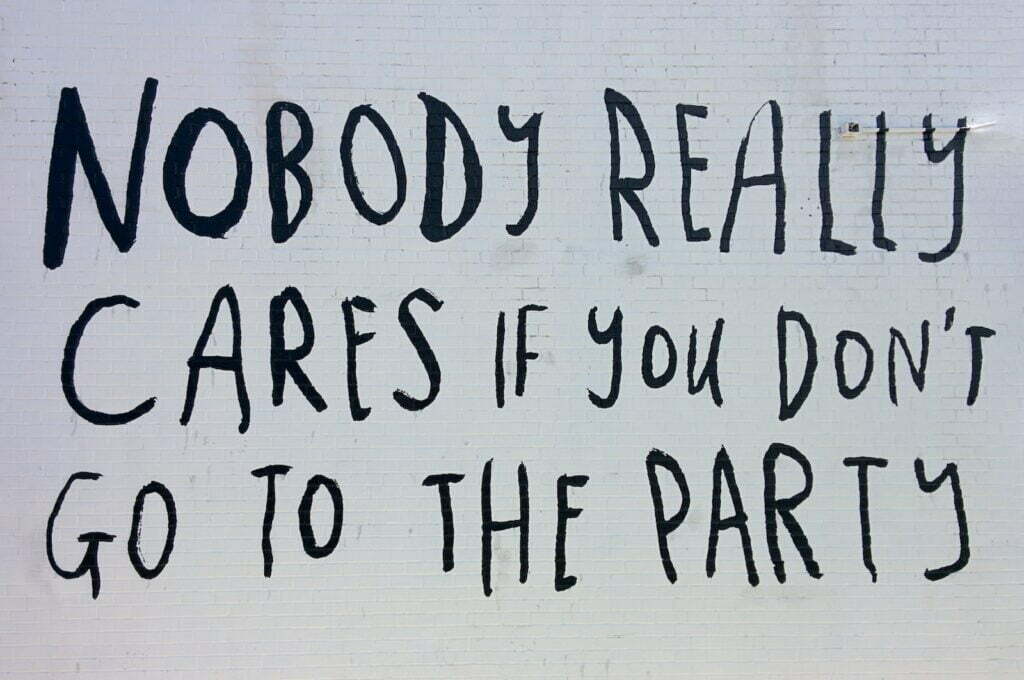
In today’s hyper-connected world, where social media platforms and real-time updates dominate our daily lives, it’s no wonder that the concept of FOMO, or the Fear of Missing Out, has taken center stage. Whether you’re scrolling through Instagram, checking your WhatsApp group chats, or hearing about your friends’ exciting plans, it’s easy to feel left out and anxious about the experiences you might be missing. In this blog post, we will explore the meaning of FOMO, its effects on our well-being, and practical strategies to overcome it.
Intro
What is the fear of missing out? As it is commonly known, FOMO is a psychological phenomenon that causes people to worry about missing out on something great.
Fomo Meaning
FOMO, the acronym for Fear of Missing Out, refers to the uneasy and sometimes irrational feeling of being left out or disconnected from social events, experiences, or opportunities. It arises from the belief that others are engaging in something more exciting, enjoyable, or valuable than what we are currently involved in. FOMO is often fueled by the constant exposure to carefully curated posts on social media, where people showcase their highlight reels, making us question our own lives and choices.
The Impact of FOMO
FOMO can have a profound impact on our mental and emotional well-being. Constantly comparing ourselves to others and feeling like we’re not measuring up can lead to feelings of inadequacy, anxiety, and even depression. It can also hinder our ability to be present at the moment, as our minds wander to what we might be missing out on rather than fully appreciating our current experiences. Recognizing the effects of FOMO is the first step toward regaining control over our emotions and finding a healthier perspective.
How To Deal With FOMO
Mindful Social Media Use
Taking a mindful approach to social media can significantly reduce the negative impact of FOMO. Limit your time on social platforms, unfollow accounts that trigger feelings of inadequacy, and remind yourself that people often present a polished version of their lives. Focus on engaging with social media content that inspires, educates, or uplifts you, rather than using it as a tool for comparison.
Embrace JOMO
The Joy of Missing Out, or JOMO, is the antidote to FOMO. Instead of feeling anxious about what you might be missing, embrace the idea that missing out can bring its own sense of freedom and peace. Take pleasure in the choices you make, whether it’s a quiet evening at home or pursuing a personal passion, knowing that you are prioritizing your own well-being and happiness.
Cultivate Gratitude
Practicing gratitude can shift your focus from what you don’t have to what you do have. Take time each day to reflect on the positive aspects of your life, such as supportive relationships, personal achievements, or simple moments of joy. By appreciating what you have, you’ll cultivate contentment and reduce the grip of FOMO.
Pursue Meaningful Experiences
Instead of chasing every event or opportunity that comes your way, focus on pursuing experiences that align with your values and bring you genuine fulfillment. By investing your time and energy in activities that truly matter to you, you’ll develop a sense of purpose and reduce the fear of missing out on superficial or inconsequential experiences.

Fear Of Missing Out Examples
There are many different examples of FOMO. Some people may feel FOMO when they see friends posting about a party they wish had gone. Others may feel it when they see someone else getting a job promotion.
Here are 20 more examples of FOMO:
-You see your friends post about a fantastic vacation they went on, and you got left out
-You find out that a party was happening and you didn’t get invited
-Your friends are talking about a TV show you have not seen.
-You see people posting about a new restaurant that just opened, and you have not been there yet.
-Someone else gets the job that you tried to get.
-Your friends are talking about a new movie that just came out, and you have not seen it yet.
-Your friends are going to a concert, and you must work.
-You see people posting about an event brand new to you.
-Someone else gets the car that you wanted.
-You find out that your favorite band is playing in town, but you cannot go because you have no tickets.
-You see people posting about a new product that just came out, and you have not tried it yet.
-Your friends are talking about a new book they are reading, and you have not read it yet.
-You see people posting about a fantastic experience, and you were not there.
-Someone else gets the house that you wanted.
-Your friends are talking about a new game they are playing, and you have not played it yet.
-You find out that your favorite celebrity is in town, but you cannot meet them because you do not have their contact information.
-Your friends are planning a trip but do not invite you to come along.
More Fomo Tips
As you can see, there are many different examples of FOMO. If you feel FOMO, it is essential to remember that you are not alone, and many people think the same way.
Here are some more tips on how to deal with this type of feeling:
- Talk to someone about how you are feeling. Talking to a friend or family can help you feel better and perspective.
- Identify your triggers. Once you know what is causing your FOMO, you can start to work on avoiding those triggers.
- Focus on the present moment. One of the best ways to combat FOMO is to focus on what is happening in the present moment.
- Make a list of things that make you happy. When feeling FOMO, take some time to think about what makes you happy. Your list could include spending time with friends, listening to music, or watching your favorite show.
- Do not compare yourself to others; comparing yourself to others will only make you feel worse. Remember that everyone has a unique journey in life.
Conclusion
FOMO can be a pervasive and distressing phenomenon in our digitally connected world, but it’s important to remember that it’s within our power to overcome it. By understanding the meaning of FOMO, recognizing its impact on our well-being, and implementing practical strategies like mindful social media use, embracing JOMO, cultivating gratitude, and pursuing meaningful experiences, we can regain control over our lives and find contentment in the present moment. So, let go of FOMO, embrace JOMO, and live a life that is truly fulfilling.





